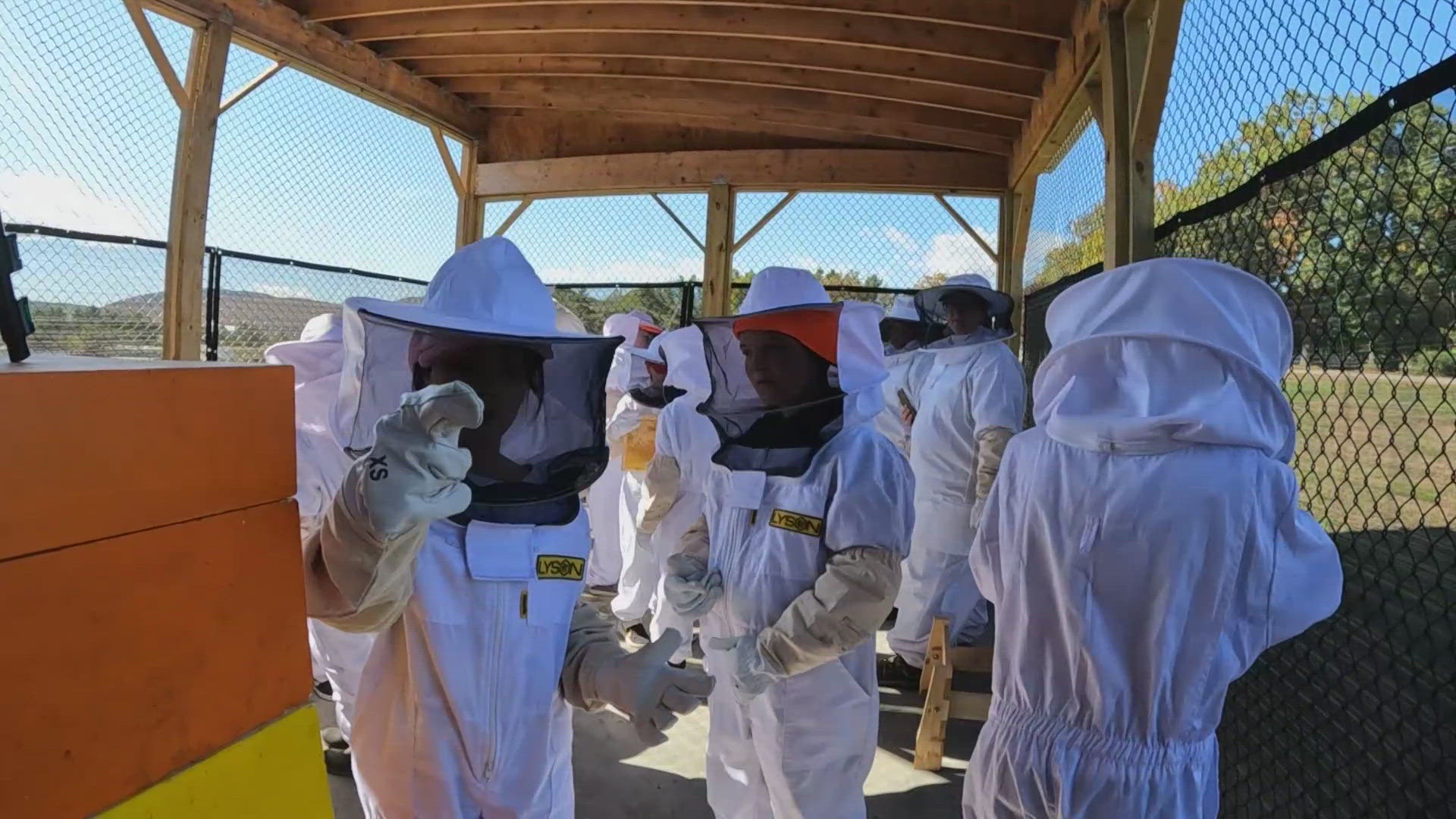MEXICO, Maine — Fourth-grade students at Meroby Elementary School regularly take a field trip that many Maine students never get a chance to—and they don't even have to leave the school grounds.
Led by teacher Maggie Corlett on a sunny October day, the energetic kids yelled and played as they piled into a wooden structure on the edge of campus. They donned white coverall suits, which included headgear, made up of black netting sandwiched between two firm, saucer-like pieces.
They poked and prodded each other's suits as Corlett and other teachers told them to form a line. But the giggles and the poking abruptly stopped— without further instruction— once the students entered a fenced-in area attached to the wooden building.
Some gave a "wow" or a quiet gasp as they stared at a collection of bee hives—a handful of wooden boxes with honey bees coming and going as they pleased.
Albert Borzelli hunched over one of the hives and pulled out a tray of honeycombs, with hundreds of bees calmly walking around on its surface. Borzelli is a beekeeper from nearby Hartford, with 15 years of experience.
"It stuck out to me that it's really changing the children," he remarked about the students' demeanor. "It's making them be more calm because they have to be calm around the bees. When I hand them a frame of bees, you see how gentle they are with them?"
Indeed, Borzelli instructed any interested kids to gather around. He showed them the exposed honey tray, and then picked up and handed them, one by one, another tray encased in plexiglass.
This is the second full school year of Meroby's beekeeping class. This fall, fourth-graders from Rumford Elementary joined in.
Were the kids scared?
"No," said an RES student as she held up a bee that had landed on her pointer finger. "My mom taught me, when I was in pre-K, that bees aren't scary, they're just not relaxed."
The bees were constantly in motion, but none seemed to care about the presence of 50 adolescents.
The lesson here went far beyond biology and learning responsibility. Corlett invited us to join her class back at school.
She had spread a blue tarp across a portion of her classroom floor, on which a large stainless steel cylinder rested. In this space, the students harvested the sticky fruits of their labor.
Corlett assigned her class to take turns delicately scraping open the honeycombs in their trays. She then transferred the trays to the cylinder and when it was filled, she closed the lid, and more students leaned their elbows on top as they turned on a spinning motor. It whirred and hurled the trays around. At the bottom, amber honey spilled from a drain into a bucket, and an attentive child stirred the liquid.
There were plentiful lessons to be learned here: Agriculture, food production, and even economics. Yes, the students bottle the honey and sell small combs, but they also craft it into lip balm and candles. They sell their goods online, promising to re-invest all proceeds back into the bee program.
All of this came about after, a few years earlier, Corlett considered leaving teaching to become a beekeeper.
"Yes, because I just needed a break and something new," she recalled. "So, the principal thought that this would be a great way to do it. So, we got $100,000 in a RREV Grant."
The Maine Department of Education's Rethinking Responsive Education Ventures program handled some $16.9 million in grants from the US education department from 2020 to July of 2024. Meroby seized the opportunity and successfully applied for funds.
"This is my joy as a teacher," Corlett smiled back at the apiary. "This is my joy to give to these kids, and I just feel like this is one of my life's works. And they pay me to do that. Like, it's hard to get a job so good, you know?"

